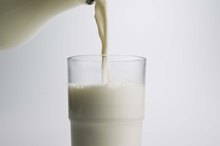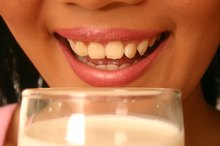Daily Milk Intake for a Pregnant Woman
You may think that being pregnant is a reason to eat whatever you want, but you only need an additional 300 calories per day, KidsHealth reports. Calcium should be included in this increase in calorie requirement because it is a crucial nutrient for you and your unborn baby. While pregnant, you will need between 1,000 and 1,300 mg of calcium per day to ensure you and your little one get what you need, and milk is a nutritious way to reach that goal.
Importance of Calcium
Your unborn baby is growing at a rapid pace and requires a consistent and constant supply of vitamins and minerals, including calcium. Consuming enough calcium as part of a healthy pregnancy diet will support the health of your own bones and teeth, as well as encourage the development of your baby's bones and teeth. Your baby also needs sufficient amounts of calcium to support the growth of her heart, nerves and muscles.
Consequences of Calcium Deficiency
Magnesium From Milk
Learn More
While you are carrying a baby, you will need to take in more calcium. If you do not get enough of this mineral for both you and your baby, your little one will take the calcium he needs from your bones. This can leave you deficient. The "Journal of Clinical Endocrinology and Metabolism" suggests that a lack of calcium, particularly during the third trimester, may lead to decreased bone density in the pregnant woman. Deficiency in calcium may also result in improper formation of your baby's bones, teeth, heart, muscles and nerves.
- While you are carrying a baby, you will need to take in more calcium.
Types of Milk
The amount of calcium you need each day during pregnancy is equal to about 4 cups of milk. Adding milk to your daily diet is a simple way to provide yourself and your growing baby with adequate amounts of this important mineral. The type of milk you choose is also important. Whole milk contains saturated fat, which you should limit in your pregnancy diet. Both 2-percent and 2-percent milk have less fat but still contain some. You may benefit most from choosing fat-free milk, which supplies equal amounts of calcium but does not contain saturated fat.
- The amount of calcium you need each day during pregnancy is equal to about 4 cups of milk.
- You may benefit most from choosing fat-free milk, which supplies equal amounts of calcium but does not contain saturated fat.
Suggested Ways to Consume Enough Milk
Folic Acid & Milk
Learn More
If the thought of drinking four glasses of milk a day worries you, there are other ways to incorporate milk into your diet to help you get the calcium you and your unborn baby need. Pour one cup of skim milk over a bowl of breakfast cereal for a quick and simple breakfast that helps you check off one cup from your daily menu. Make a fruit smoothie with milk rather than juice as another way to include this important beverage in your pregnancy diet. Use milk in your oatmeal, when you bake and in soups and other recipes as additional ways to reach your goal of four cups every day. Your daily calcium intake does not need to come solely from milk. Other sources of calcium include black-eyed peas, canned salmon, collard greens and oranges, according to the Harvard School of Public Health.
- If the thought of drinking four glasses of milk a day worries you, there are other ways to incorporate milk into your diet to help you get the calcium you and your unborn baby need.
- Make a fruit smoothie with milk rather than juice as another way to include this important beverage in your pregnancy diet.
Related Articles
References
- KidsHealth: Eating During Pregnancy
- Baby Center: Calcium in Your Pregnancy Diet
- Pregnancy Guide: An Illustrated Handbook for Every Trimester; Brenda Lane, et. al.
- Harvard School of Public Health: Calcium Sources in Food
- National Institutes of Health Office of Dietary Supplements. Calcium - Fact Sheet for Health Professionals. March 2, 2017.
Writer Bio
Sara Ipatenco has taught writing, health and nutrition. She started writing in 2007 and has been published in Teaching Tolerance magazine. Ipatenco holds a bachelor's degree and a master's degree in education, both from the University of Denver.









